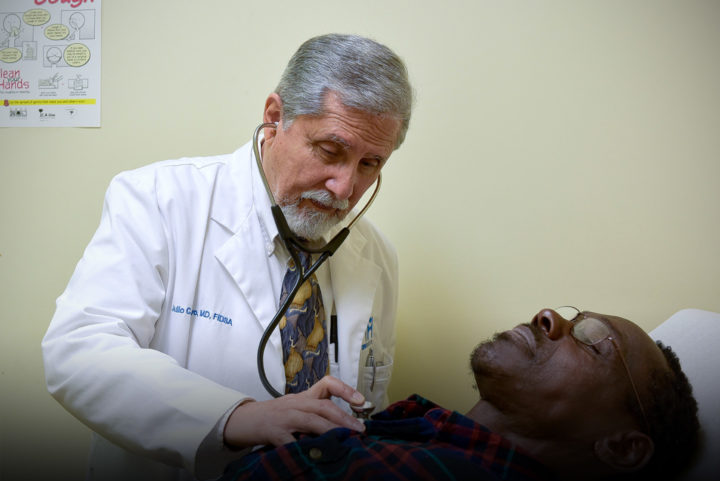Infectious Diseases: A Macro Look at Microbial Problems

One of the most well-known infectious diseases of our era is HIV. More than three decades have passed since AIDS first captured global attention and put a name to the epidemic that terrified communities. The epidemic led to the establishment of health clinics and centers dedicated to helping those infected by the virus and, over time, many of these centers have evolved in to the specialized departments for treating a multitude of infectious diseases.
An Infectious Diseases department treats patients diagnosed not just with high-profile infections such as HIV, but also with a range of acute and chronic infectious diseases, from childhood diseases such as measles and mumps, to long-hidden infections such as hepatitis C that present health problems later in life, to rare infections, and emerging epidemics such as the mosquito-born virus, Zika.
Board-certified infectious diseases physicians complete an infectious diseases fellowship through the American Board of Internal Medicine in addition to two years of study and a basic three-year internal medicine residency. Their role includes not only treating an infection and its symptoms, and identifying the various fungi, bacteria, parasites and/or virus that caused the infection, but also, diagnosing how a patient acquired their infections and preventing recurrent infections or transmission. According to Dr. Michael K. Foxworth, II, a pediatric infectious diseases specialist at HopeHealth, treatment can be broad and depends on the infection itself. Foxworth said that, in many cases, infectious diseases can be prevented with vaccines and behavioral interventions that interrupt the transmission process.
There are multiple ways infectious diseases can be transmitted. Some diseases are carried through contaminated food and/or water supplies, others by person-to-person contact, insect bites or wounds from animals, or other environmental exposures. To combat transmission, physicians identify and treat these diseases, their causes, and address prevention issues. Dr. Rishika Motiani, an infectious diseases and primary care doctor at HopeHealth, said the Infectious Diseases Department also works in tandem with other departments, and care is coordinated across specialties that can include pain management, substance abuse, mental health, and primary care.
Population health plays a key role in such prevention by helping identify risk factors for specific populations in local communities. By encouraging these populations to have annual checks or procedures that can help prevent the spread of infectious diseases, population health research helps providers address issues directly impacting a community and puts that community on track for better health care outcomes. Some examples are early childhood immunizations that prohibit the spread of diseases like measles and mumps; women’s health examinations such as Pap smears that aid in the early discovery and treatment of infectious diseases like chlamydia; and targeted issues such as promoting hepatitis C testing for those born between 1945 and 1965.
At community health centers such as HopeHealth, the infectious diseases department is also based on an integration of care model encompassing three areas of service: clinical, community and client services.
Clinical Services include providing medical care for infectious diseases patients, ensuring clients receive medications and medication education, providing and/or coordinating referrals for additional services such as primary care, behavior health and substance use.
Client Services include the coordination of infectious diseases patients’ medical and support services to: ensure clients receive medication, remain engaged in care, and have access to support services such as transportation, support groups, and housing assistance.
Community Services include partnering with local community organizations and agencies to provide free rapid HIV and hepatitis C screenings, as well as provide HIV, STD, HCV education and awareness, including evidence-based interventions. Additional services include locating and helping new and former clients re-engage in care.
Specialties of HopeHealth Infectious Diseases Services
- Hepatitis A, B, C
- HIV/AIDS and STIs
- PrEP (Pre-exposure Prophylaxis)
- Chronic Pneumonia
- Lymphadenitis/Lymphadenopathy
- Recurrent Staphylococcal skin abscess and cellulitis
- Pacemaker and ICD site infections: Endocarditis
- Bone and Joint Infections: septic arthritis, prosthetic joints, osteomyelitis
- Granuloma: Histoplasmosis, Coccidiodmycosis, Cryptoplasmosis, Mycobacterial infections
- Neurological infections: infection of the brain and spinal cord, infection of the brain following neurosurgery, meningitis, brain abscess and encephalitis
- Tick-borne illnesses
- Hypogammaglobulinemia
- International Travel Clinic
